There’s a widespread and ongoing debate in the culinary world over whether professional chefs should measure every ingredient. Of course, you’ll find diehard proponents with a list of logical reasons why successful recipes need careful attention to ingredient amounts.
On the other hand, there are those chefs who claim never to measure ingredients, but instead add whatever feels right. Many chefs on this side of the aisle claim that meticulous measurement can interfere with the creative process in the culinary arts.
Whereas baking can require careful measurement of ingredients, it’s often said that one of the joys of cooking is the freedom not to be so precise. Depending on your passions, preferences, and personality type, one approach might work better for you than another.
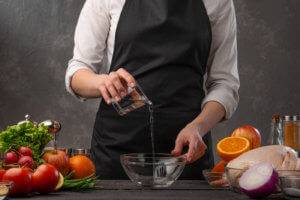
All of this said, in order to know what needs a dash more or less, you need to start by measuring everything. With time you will become intimately familiar with the types of spices, seasonings, and other ingredients — and their quantities — needed for your recipe.
Measuring in a Professional Setting
If you’re working in a restaurant kitchen, you’ll be required to measure precisely. There are good reasons for this. For one, patrons will expect a meal that always tastes the same. If they receive a cassoulet that is seasoned differently every time they visit your restaurant, they’re likely to take their business elsewhere at some point. Restaurants become well-known and well-loved largely because of the consistency they provide to their customers.
Additionally, executive chefs and restaurant managers won’t appreciate you going rogue on their carefully crafted recipes. Many of the offerings on a restaurant menu come from years of work and experimentation. And if your restaurant serves patrons who are also fans of the head chef, they’re going to want the head chef’s most authentic culinary masterpieces.
“Culinary school taught me to be in touch with the classic dishes from around the world. Most of all, it was a concentration on technique. Also, it provided the opportunity to work in a team environment with a bunch of other chefs to put together a meal.”
Jeffrey Lammer, Kitchen Manager and Boulder Culinary Arts Graduate
Often, the practice of mise en place, something most chefs learn via their culinary education, is a primary way that chefs can succeed in their early careers. Having everything in its place and being able to access what you need when you need it is an excellent strategy for keeping the kitchen operating smoothly even during the busiest times. You may even be weighing and measuring ingredients prior to the restaurant doors opening for the day, just to be as prepared as possible when the orders start rolling in.
The Essential Culinary Career Survey
The Essential Culinary Career Survey
What's your ideal culinary career: Fine dining? Your own restaurant? Pastry? Get our self-evaluation survey to find out!
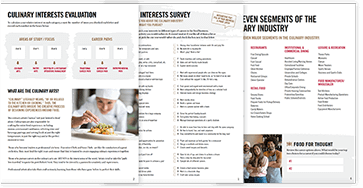
We’ve compiled a checklist of all of the essential questions into one handy guide: career options, culinary interest surveys, educational opportunities, and more.
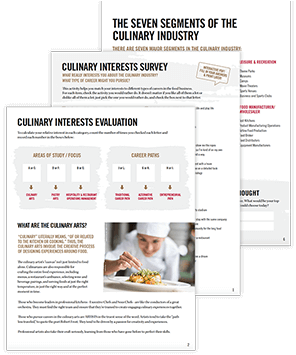

Cooking without Measuring
Of course, in your personal home kitchen, you can experiment much more with cooking or baking on a whim than you could in someone else’s kitchen. For many chefs who work in restaurants, their home kitchen is where they get to scratch that itch to try new culinary creations. But it still takes experience and trial-and-error to do effectively.
There’s nothing worse than having to toss a finished product because you’ve botched the ingredient quantity somewhere and the taste or texture has made it inedible. With this in mind, work carefully and add sparingly, a bit at a time. It’s always easier to add more of an ingredient than it is to remove it.
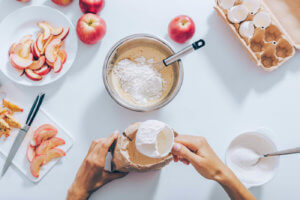
If you have a career in recipe or menu development or you open your own restaurant, you can experiment endlessly. Some careers, like those in the field of Research and Development, require curiosity and innovation in order to produce new formulas and findings.
Knowing What and How to Measure
Whether you’re cooking or baking, having a solid educational foundation is crucial. Escoffier students get foundational education in measuring techniques and tips from Chef Instructors with decades of experience. These chefs offer the opportunity for you to learn from their mistakes and successes as they share while taking you through the program curriculum.
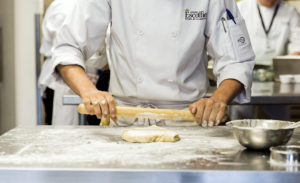
Examples of some crucial measuring know-how you might learn in culinary school are the difference between liquid and dry measuring cups or the appropriate way to pack brown sugar. These may seem like small takeaways, but they can make all the difference in the success of your recipes and, ultimately, your career.
“The Pastry Arts program at the school gave me the foundation to build my career. The chef educators provide real life tips and formulas I could never get from books. My co-workers are surprised by how much help the school has given me throughout my career.”
Kim Boos, Pastry Chef & Owner and Boulder Pastry Arts Graduate
Escoffier students also receive a professional toolkit tailored to their program of choice. Items in the utensil kit, like the scale, ruler, and digital probe thermometer and timer will assist students in perfecting their recipes based on the rules of measurement in the kitchen.
Build Your Foundations at Escoffier
Interested in learning more about proper measuring techniques, mise en place, and general organization in the kitchen? Want to know exactly how to use every tool in a professional chef’s toolkit? Escoffier offers online degree and diploma options in culinary arts and pastry arts, as well as programs on our Boulder or Austin campuses.
Within each curriculum, students glean practical knowledge about measurement tools and techniques that they can then put to use during their hands-on industry externship. Classroom or online forums also provide the ability to ask questions, share tips, and bounce ideas off of other students.
Once you receive the knowledge you need on how to measure in the kitchen: practice, practice, practice. You’ll find yourself more equipped and excited to experiment with measure-free cooking or baking.
“The reason I went to Auguste Escoffier School of Culinary Arts was to make it a career and not just a job living paycheck to paycheck. It opened my eyes to all these techniques that make my food the best I’ve ever cooked in my life. The school provided the methodology behind the basic recipes of everything that I needed to know for production… and the proper tools and ability to work in any kitchen.”Vanessa M. House, Line Cook and Boulder Culinary Arts Graduate
Did you find this article interesting? Check out these next:
- How to Become a Chef: The Complete Guide
- What Are The Baking and Pastry Arts…and Is It a Career for You?
- How Much Education Do You Need to Be a Chef?
This article was originally published on October 26, 2016, and has since been updated.

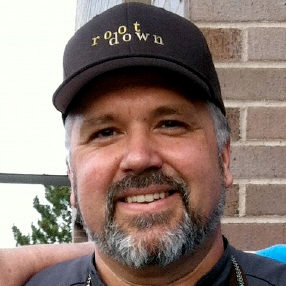 “Culinary school taught me to be in touch with the classic dishes from around the world. Most of all, it was a concentration on technique. Also, it provided the opportunity to work in a team environment with a bunch of other chefs to put together a meal.”
“Culinary school taught me to be in touch with the classic dishes from around the world. Most of all, it was a concentration on technique. Also, it provided the opportunity to work in a team environment with a bunch of other chefs to put together a meal.”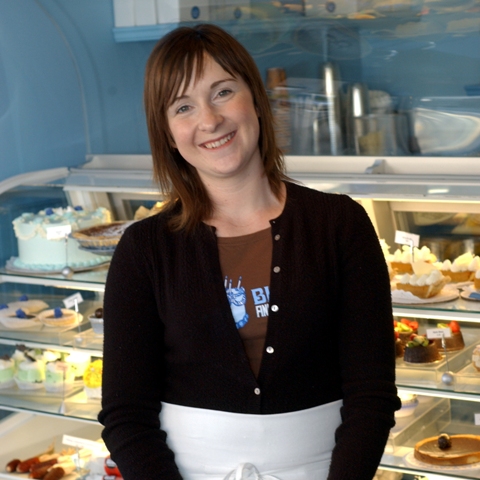 “The Pastry Arts program at the school gave me the foundation to build my career. The chef educators provide real life tips and formulas I could never get from books. My co-workers are surprised by how much help the school has given me throughout my career.”
“The Pastry Arts program at the school gave me the foundation to build my career. The chef educators provide real life tips and formulas I could never get from books. My co-workers are surprised by how much help the school has given me throughout my career.”

